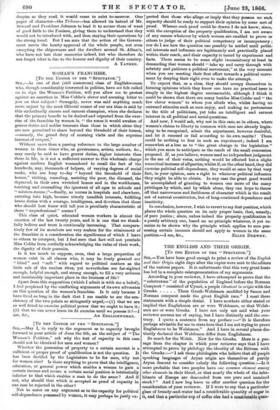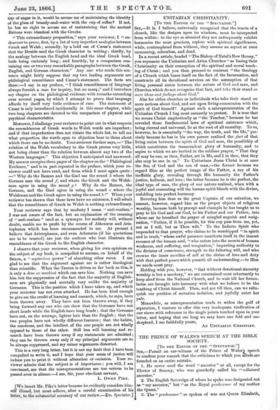THE ENGLISH AND THEIR ORIGIN.
[To THE EDITOR OF THE "SPECTATOR."] Sui,—You have been good enough to print a review of the English and their Origin eight days after the copies were sent to the editors of the various papers. It is unfortunate that this very great haste has led to a complete misrepresentation of my arguments.
According to your reviewer, I have attempted to prove that the " substratum " of the population of England before the Norman Conquest "consisted of Cymri, a people identical in origin with the Greeks These Greek-Welshmen modified by Saxon and Norman conquest made the great English race." I meet these statements with a simple denial. I have nowhere either stated or implied that Englishmen are or were Welshmen, or that Welsh- men are or were Greeks. I have not only not said what your reviewer accuses me of saying, but I have distinctly said the con- trary. I quote a sentence from my preface :—" It is therefore perhaps advisable for me to state here that Jam not trying to prove Englishmen to be Welshmen." And I have in several places dis- tinctly declared that Welshmen differ from Englishmen.
So much for the Welsh. Now for the Greeks. Here is a pas- sage from the chapter in which your reviewer says that I have attempted to prove by philology the identity of the Britons with the Greeks :—" I ask those philologists who believe that all people speaking languages of Aryan origin are themselves of purely Aryan descent to consider calmly the following question :—Is it more probable that two peoples have one common element among other elementz in their blood, or that nearly the whole of the inha- bitants of Europe are descended from one pure and unmixed stock ? " And I now beg leave to offer another question for the consideration of your reviewer. If I were to say that a particular glass of brandy-and-water had a considerable quantity of sugar in it, and that a particular cup of coffee also had a considerable pan-
tity of sugar in it, would he accuse me of maintaining the identity of the glass of brandy-and-water with the cup of coffee? If not, he has no right to accuse me of maintaining that the ancient Britons were identical with the Greeks.
"This extraordinary proposition," says your reviewer, I "en- deavour to prove, first, by a list of very imperfect analogies between Greek and Welsh ; secondly, by a bold use of Caesar's statement that the Druids used the Greek character in writing ; thirdly, by the analogy between the English head and the ideal Greek head, both being curiously long ; and fourthly, by a comparison con- taining one or two very remarkable paragraphs between the Greek, English, and German characters." Any one who reads this sen- tence might fairly suppose that my two leading arguments are philological resemblance and Ctesar's statement. The facts are these :—I say in my preface, "I think resemblances of language always furnish a case for inquiry, but no more ;" and I introduce my chapter on the philological evidence with remarks extending over several pages, by which I attempt to prove that language affords by itself very little evidence of race. The statement of Caesar is only introduced incidentally in this same chapter, while two long chapters are devoted to the comparison of physical and psychical characteristics.
Moreover, I challenge your reviewer to point out in what respects the resemblances of Greek words to Welsh words are imperfect ; and if that imperfection does not vitiate the whole list, to tell me what proportion the words open to objection bear to those about which there can be no doubt. Your reviewer further says,—" The relation of the Welsh vocabulary to the Greek proves very little, not being closer than the relation between almost any two of the Western languages." This objection I anticipated and answered. My answer occupies three pages of the chapter on the "Philological Evidence," and is in part repeated in the preface, which your re- viewer could not have read, and from which I must again quote : —" Why do the Roman and the Gael use the sound k where the German uses the sound f, and where the Greek and the Welsh- man agree in using the sound p? Why do the Roman, the German, and the Gael agree in using the sound s where the Welshman and the Greek agree in using the sound h?" When your reviewer has shown that these laws have no existence, I will admit that the resemblance of Greek to Welsh is nothing extraordinary.
Your reviewer says that by modesty I mean "anti-realism."
I was not aware of the fact, but an explanation of the meaning of " anti-realism " used as a synonym for modesty will, without doubt, enable me to profit by the course of Athenaeus and Aris- tophanes which has been recommended to me. At present I believe that Aristophanes, and even Athenmus (if his quotations are to be trusted) are just the authors who beat illustrate the resemblance of the Greek to the English character.
I observe that your reviewer, when giving his own opinions on the subject of my book, is compelled to assume, on behalf of the Saxon, a "mysterious power" of absorbing other races. I am glad to see that the argument against me is rather theological than scientific. When the Teuton is driven so far back as this, it is only a dens ex machind which can save him. Nothing can save him but the suppression of the fact that the majority of English- men are physically and mentally very unlike the majority of Germans. This is the position which I have taken up, and which your reviewer has not even attacked. He has been kind enough to give me the credit of learning and research, which, he says, have been thrown away. They have not been thrown away, if they bring forward any one who can show that the Germans have not short heads while the English have long heads ; that the Germans have not, on the average, lighter hair than the English ; that the two peoples have not wholly different features ; that the habits, the emotions, and the intellect of the one people are not wholly opposed to those of the other. Still less will learning and re- search have been thrown away if my statements are admitted ; they can be thrown away only if my principal arguments are to be always suppressed, and my minor arguments distorted.
This is a very long letter, but it is not my fault that I have been compelled to write it, and I hope that your sense of justice will induce you to print it without alteration or omission. Your re- viewer admits that the subject is of importance ; you will, I am convinced, see that the misrepresentations are too serious to be passed over in silence.—I am, Sir, your obedient servant,
L. OWEN PIKE.
[We insert Mr. Pike's letter because he evidently considers him- self Mused, but must adhere, after a careful examination of his letter, to the substantial accuracy of our review.—En. Spectator.]































 Previous page
Previous page